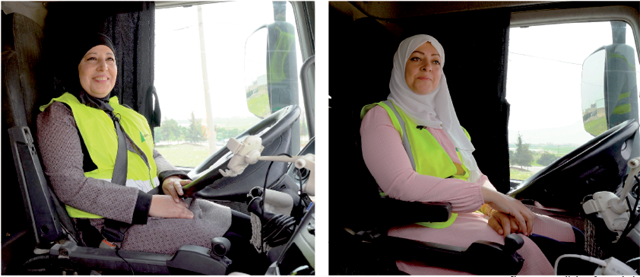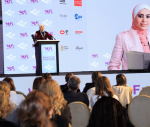You are here
Jordanian women make inroads into top posts
By Batool Ghaith - Feb 24,2021 - Last updated at Feb 24,2021

According to World Bank figures, women’s participation in the workforce in Jordan is estimated at 16 per cent (Photo courtesy of SIGI facebook page)
AMMAN — Women in Jordan are taking on more non-conventional roles in the workforce, according to experts.
According to World Bank figures, women’s participation in the workforce in Jordan is estimated at 16 per cent.
“The percentage of women working in our company is 64 per cent, with half of them in senior positions. Women are capable of taking any role in the workforce, and we have witnessed many successes in Jordan for women in conventional as well as non-conventional jobs such as logistics, which is a male-dominated sector,” Abeer Qumsieh, founder and CEO of a consulting firm, told The Jordan Times.
Noura Mehyar is the CEO of a logistics company, she is also an active investor in several other SMEs in Jordan. In 2016, she became the first recipient of the Multilateral Investment Guarantee Agency (MIGA) Gender CEO Award for her work in integrating women into a male-dominated workforce. In 2017, she was selected to be part of a 13-member commission in the LSE-Oxford Commission on State Fragility, Growth and Development.
“I started my career in 2001 as a project coordinator and manager for several projects in the MENA region. And I have been holding the position of CEO in a logistics company since 2008. It is always interesting to see the look on people’s faces when I introduce myself as the CEO, no one actually expects it. Initially it intimidated me, today I find joy and a sense of accomplishment when stakeholders actually appreciate my knowledge and respect the work of the company,” Mehyar told The Jordan Times.
“The main challenges women face are lack of acceptance, long working hours and personal compromises that they need to make in order to be in a leadership role,” Mehyar added.
Support from management in companies goes along way in helping women succeed, said Qumsieh
“The environment and the culture of the organisation play an important role. The more understanding and support we show women, the more they will be successful,” Qumsieh said.
Yasmin Hushki, technical assistance team manager at a firm, shared her experience to success.
“I have been working in this company for 10 years, with a degree in computer engineering, I started as a customer support engineer. I was the only female in a 20-person team. The company had only 10 females in similar roles at the time, but we all knew, supported and celebrated each other” Hushki told The Jordan Times.
“One of the biggest challenges I faced was getting an advanced certification called the CCIE. It required a lot of effort and a trip abroad to take the qualifying exam. At the time, it was uncommon for a female to acquire the CCIE certification. Shortly after I obtained the certification, I was promoted to a technical team leader role, which was also uncommon to be assigned for a female,” Hushki added.
Several studies around the world constantly found that employing women is good for business survival and growth, regardless of the sector. However, businesses in Jordan are lagging in this respect as they do not seem to be aware of the great value that women can bring to the workplace, experts say.
“Jordan has a long way to go in terms of gender diversity and equality when it comes to the workplace, several civil society organisations are working to identify the limitations to having more women in the workforce. We, on the other hand, need society to realise the value of working women and offer them support,” Mehyar noted.
The possibility of women succeeding in non-conventional roles happens when the employers and employees tackle the social norms and gender roles, Qumsieh said.
“We need more awareness for both the governmental and private sector along with the public in general that women and men can both be breadwinners. This will help more women to join the workforce,” Qumsieh added.
Women nowadays have more opportunities to work on themselves and develop their skill set, according to Hushki.
“As part of our community outreach programmes, we target girls at schools and universities. I have personally worked on two projects: Green Light for Girls and Pro-Girls. In these projects we reached out to girls and encouraged them to pursue their studies in ICT fields,” Hushki said,
For Mehyar, her advice to women is: Think about the opportunities, not the limitations.
Related Articles
AMMAN — Holcim Group, a Swiss-French multinational company that manufactures building materials, has launched a gender diversity progr
DUBAI — Zimbabwe’s Minister of Industry and Commerce Sekai Nzenza on Tuesday credited access to education for shaping her leadership capabil
AMMAN — The Businesswomen’s Committee at the Amman Chamber of Commerce (ACC) has launched its first trade fair on Friday to support women-le

















